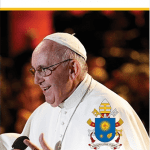It started in January at a school in San Francisco:
St. Ignatius College Preparatory High School has suspended 14 students for their participation in a Jan. 23 outdoor party that “had an inappropriate theme with racial overtones and racist implications,” school officials said in a Jan. 28 statement posted on the school’s website.
Students at the party, organized by non-St. Ignatius High students and attended by students from several high schools, “wore clothing that appropriated pervasive negative stereotypes of Black culture,” the statement said. “We categorically condemn this gathering as it does not represent the Ignatian values or ideals that our school stands for, and thus we are called to respond.”
In February, you had this incident at a Catholic school in Indiana, where students were accused of racist taunts during a basketball game.
Then just this week, two other incidents were reported at Catholic high schools in different parts of the country.
A teen is facing charges after a Lexington police investigation of a complaint filed by the mother of a Lexington Catholic High School student on behalf of her son.
A 17-year-old boy was charged Thursday with harassing communications and third-degree terroristic threatening, police said. His name has not been released because he is a juvenile.
The Key Newsjournal reported Wednesday that a black Lexington Catholic student was harassed by teammates on the school’s football team.
The Key Newsjournal reported that Denisha Vinegar said she found threatening messages to her son, DaMarco, on his computer. Vinegar said the messages included a threat of lynching as well as comments telling her son to pick cotton or sell crack to make money, according to The Key Newsjournal report.
The Key Newsjournal said police are investigating the complaint as a hate crime, but Lexington police said Thursday morning that it “is up to a court to determine if an act is bias-motivated.”
A racist death threat video posted on social media by a Central Catholic High junior has led to the suspension of students involved and a criminal investigation, but an African American community group is calling for calm while police do their work.
“People are asking me, ‘What can I do?,’ but I want to find out what’s been done, first. Let the natural process take its course,” said attorney Jacq Wilson, who is working with the family of the boy targeted in the video.
The family will meet with detectives, and school and church officials Friday morning, Wilson said, and in the afternoon attend a special meeting called by Advocates for Justice, a group Wilson and his brother formed to mentor African American students.
A stunned Tanya Porter first contacted the school after she saw the 12-second Snapchat video showing a white teen playing with a noose as he says “You must die (expletive).” Her son’s name follows as he and boys unseen laugh, then the scene cuts to a handgun being fired.
Porter showed staff the video Monday morning when classes resumed after Easter break, but said on Tuesday her son saw the boy walk into his classroom delivering papers for the office. Fearing for his safety and others if the school did not take the threat seriously, she contacted Wilson.
Wilson, an attorney in San Francisco who grew up in Modesto, said since the story broke, he has had a number of calls and emails saying the video was “just a joke.”
One writer, citing other examples (not exclusively Catholic) notes this problem runs wide and deep:
This much is clear — racism is alive and well in America’s youth and being black in America still means the strong possibility of being subjected to violent death threats and harassment just because of the color of your skin.
The simple fact that we keep seeing news reports about racist incidents at Catholic schools should serve as a wake up call. The evil of racism has been labeled “intrinsic” by Catholic theologians, placing it on a par with genocide, terrorism, torture and abortion—something which is always, by its very nature, a grave sin.
Maybe it’s time to remind ourselves of that—and remind our children.
From Gaudiem et Spes:
Any kind of social or cultural discrimination in basic personal rights on the grounds of sex, race, color, social conditions, language or religion, must be curbed and eradicated as incompatible with God’s design.
From the U.S. bishops:
Racism is a sin: a sin that divides the human family, blots out the image of God among specific members of that family, and violates the fundamental human dignity of those called to be children of the same Father. Racism is the sin that says some human beings are inherently superior and others essentially inferior because of races. It is the sin that makes racial characteristics the determining factor for the exercise of human rights. It mocks the words of Jesus: “Treat others the way you would have them treat you.” Indeed, racism is more than a disregard for the words of Jesus; it is a denial of the truth of the dignity of each human being revealed by the mystery of the Incarnation.
There are some things we must never do, as individuals or as a society, because they are always incompatible with love of God and neighbor. Such actions are so deeply flawed that they are always opposed to the authentic good of persons. These are called “intrinsically evil” actions. They must always be rejected and opposed and must never be supported or condoned. A prime example is the intentional taking of innocent human life, as in abortion and euthanasia.
Other direct assaults on innocent human life, such as genocide, torture, and the targeting of noncombatants in acts of terror or war, can never be justified. Nor can violations of human dignity, such as acts of racism, treating workers as mere means to an end, deliberately subjecting workers to subhuman living conditions, treating the poor as disposable, or redefining marriage to deny its essential meaning, ever be justified.
Last month, Cardinal Peter Turkson of the Pontifical Council for Justice and Peace spoke eloquently about this issue:
Pope Francis most emphatically condemns the evil of racism in the world today. “The problem of intolerance must be confronted in all its forms: wherever any minority is persecuted and marginalized because of their religious convictions or ethnic identity, the wellbeing of society as a whole is endangered, and each one of us must feel affected “.
When the Zulu people of South Africa greet someone, they say “Sawubona,” which means “I see you”. The one being greeted responds with “Sikhona” which means “I am here.” The greeter ends by affirming “Ubuntu” which means, “We are, and so I am”.
Let me contrast this remarkable form of exchange with the experience of racism. Its effect is to render people invisible, and from that follows the denial of human dignity, then loss of identity, then personal despair, then social and political distrust – it unleashes a host of ills that have penetrated into every facet of life.
Racism excludes its victims from the basic resources they need. Among these are decent housing, a good education, jobs for those who can work, upbringing for the young and care for the elderly. These barriers are not imagined – they are all too real, and the enormous injustice and suffering they cause cry out for them to be torn down and overcome. In his second inaugural address (the 15l” anniversary is tomorrow, 4 March 1865), Abraham Lincoln so eloquently bemoaned “all the wealth piled by the bondsman’s two hundred and fifty years of unrequited toil”.
The suffering is found on both sides of the barriers: among those who harbour hatred in their hearts and minds, and those who must endure its impact. And it does not dissipate quickly. You know better than I do what the legacy of slavery has meant for this country, and other countries are marked in similar tragic ways.
All peoples must restore and preserve the fundamental bonds of mutuality – brotherhood and sisterhood – that God intends for us.












